A Canadian Version of Planet China
It would not be many days into our visit before we understood food would become a key part of our China experience.
Here we were hosted to a sumptuous home cooked meal by the cousins (centre) of Lorin and Jin.
Link Here for Part II of this Story
Hello China, Here we Come Part 1 (see footnote 1)
Over a couple of weeks last month Lynn and I had an opportunity to take a whirlwind tour of China. As it worked out, our amazing nephew Lorin (2), his wife Jin An and son Laur were living in Beijing, so it was an easy decision. We often wondered about that, magical, mysterious country and felt a visit was a perfect way to sort fact from fiction.
Is the country completely polluted and is the traffic any worse than Vancouver? Are the people pushy or polite? Are the Chinese so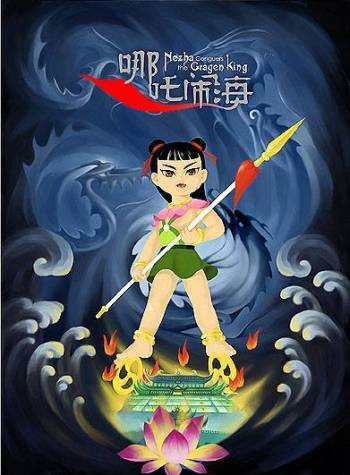 clever and determined they will one day dominate the world? Could anyone or anything stand in the way of a technologically advanced country with a population of 1.5 billion and so much money they have no idea how to spend it? Are they on their way owning the United States as well as all the oil in Canada? How about a simple question – can a stray dog or cat survive in China?
clever and determined they will one day dominate the world? Could anyone or anything stand in the way of a technologically advanced country with a population of 1.5 billion and so much money they have no idea how to spend it? Are they on their way owning the United States as well as all the oil in Canada? How about a simple question – can a stray dog or cat survive in China?
Insert (Web): Top 10 in China: Nezha Conquers the Dragon King. The flower, bottom centre, was often observed floating in water filled ponds in many temples.
Fiction, fact and myths about China are so thoroughly intertwined, that no one seems to know for sure and everyone has an opinion. While we cannot explore every facet of life in China, we will sort out what we can.
So with Passports, Visa’s and maps in hand, we donned our ‘rose coloured glasses’ and caught an Air China flight out of Tokyo after spending a couple of weeks in that country. To be sure, we would find many differences between Japan and China. Just to make certain we could see things clearly, we each grabbed a pair of polarizer clip-ons. Thank you for joining us in Part I of this three-part series. PS We have taken plenty of pictures to back up our observations.
You may find that tagging along with Lorin will be a real treat. Being quick of wit and possessing both a dry, and wry sense of humour, it is fun watching him work his magic. Witless tourists such as ourselves, working alone, would not stand a chance in China, but turn Lorin loose and he will quickly have things sorted out. Match him up against a difficult person and he will have that person eating out of his hand quicker than if his grandmother was handing out strawberry short cake.
Although Lorin’s hair is now closely cropped and his dress more traditional in deference to his emerging status on campus, it was entertaining watching him break into Mandarin while sporting the tanned skin, long hair and the rugged good looks of a California surfer.
1. Off to a Rocky Start
Arriving in Beijing late, tired, out of sorts and more than a little disoriented, it was comforting to see a smiling face at the International Arrivals gate of that massive Beijing Airport. Our reason for being late was simple – a mysterious, unscheduled, late night stop in the coastal city of Qingdao, some 600 km southwest of Beijing.
It all began a few hours after our departure from Tokyo and well short of our destination. It was dark on the runway, save for a few dim lights in the distant horizaon. We were half asleep when our aircraft suddenly began to descend without explanation, or at least an explanation we could understand. After landing and taxiing to a seemingly deserted part of an airport, we were unceremoniously hustled off the aircraft and placed on buses. We even had to take our carryon luggage as if the flight was ending. Never having this happen before in many dozens of flights, we were more than a little nervous, as one told us a thing.
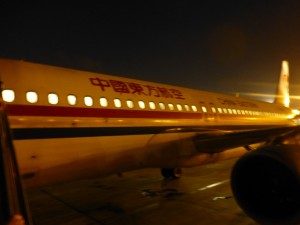 Photo: Snapped as we walked down the dark ramp to the tarmac and toward to two waiting busses. It was raining lightly which added to the sense of foreboding. I took the photo to make sure someone knew we actually survived the landing. Of course, when I tried to snap a photo inside some the building into which we were ushered, I was quickly rebuked by security person.
Photo: Snapped as we walked down the dark ramp to the tarmac and toward to two waiting busses. It was raining lightly which added to the sense of foreboding. I took the photo to make sure someone knew we actually survived the landing. Of course, when I tried to snap a photo inside some the building into which we were ushered, I was quickly rebuked by security person.
After stopping near a dimly lit reception area, in the distance we could see a sign indicating we were at the Qingdao International Airport. That was good, as it seemed others had landed here before, but we mistakenly assumed China had more to offer in the way of welcome. After being ushered down several darkened hallways, not one of the non-Chinese speaking passengers had any idea what was happening. Perhaps the Chinese on our flight were just as mystified.
We eventually reached a checkpoint where our bodies and luggage were scanned as well as our Passports and Visa’s checked. With everything apparently in order, we were again on the march. Several minutes later we entered a second scan, luggage, Passport and Visa check. This time boarding passes were issued and a little over an hour after landing we were back on the same aircraft getting ready for takeoff. It was as if we had just played a bit part in Rod Serling’s, The Twilight Zone. An hour or two after that we landed in Beijing and were greeted by Lorin.
On the way to our hotel at the University of Beijing, near where Lorin, Jean and Laur live (also Jean’s parents), Lorin explained our unscheduled stop:
“It’s simple. Quindao Airport is hoping to grow in status. By taking in extra flights they increase their aircraft landing and passenger screening volume as a means to gain that status. It’s probably no different than what happens in Winnipeg, Regina, Calgary, Edmonton, Victoria or any other small airport in Canada who want to become one of the big guys like Montreal, Toronto or Vancouver.”
Sure enough two weeks after our return to Canada I checked the Quindao Airport Website and was greeted with a banner headline stating: “Warmly celebrate that the annual passenger volume of the Qingdao International Airport has ‘overfulfiled’ 10 million to enter into the large scale airport rank.” (In 2024 I checked this airport and its no longer provides an English transition as it did back 2014. Perhaps the political world has changed)
Welcome to China. You only need to understand how things work.
2. Dispelling the Myths
When visiting China for the first time, you better discard everything you’ve ever been told about the country. Keep your eyes open, trust your smell, but forget your ears. Even Lorin, who has a good command of Mandarin, has difficulty keeping up with the staccato flow of conversations, particularly in groups as there are so many nuances in the flow. Of course, the English language, with so many similarly spelled and spoken words having different meanings, it must be equally difficult for non-English speaking persons to understand.
Prior to our arrival Lorin warned us that pollution, traffic, crowding, as well as the non-stop hustle and bustle might test our gentle West Coast view of the world. He warned: “and if you think the traffic and pollution is bad in Beijing, just wait until you get to Shijiazhuang.”
I note as recently as March 9, 2014, in a Facebook post, Lorin is still peddling the same line: “…and if you think Beijing is bad, allow me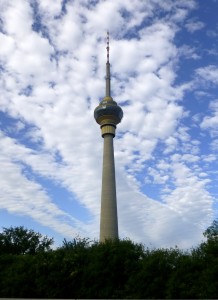 to introduce you to my friend Shijiazhuang! (reference link above)
to introduce you to my friend Shijiazhuang! (reference link above)
While it is certain our nephew has our best interests at heart, we think he might be judging his adopted country a bit harshly. You know the old saying about familiarity…
For Lynn and me, wearing our ‘rose coloured glasses’ the country looks much better. Just after our arrival there was a heavy rain, then a High Pressure area settled in over Beijing. The skies cleared, the sun came out and a thin layer of drifting clouds provided soft relief for the thousands of skyscrapers that dot the city. It was ideal weather for touring.
After breakfast with Lorin and his family we began our first day by spending a little time playing with a number of young mothers, grandparents, and children who were gathered on a large polished marble foyer just outside our hotel near the University. They were as welcoming as those in any other part of the world, and they eagerly posed so they could show off their babies and young children or grandchildren. Beaming Grandparents stood in the background. It seemed the hotel people were not all that happy about the non-paying visitors, but seemed to tolerate the daily gathering.
Of course, Beijing, as with every major city, is filled with non-stop activity. That China is now open to the world after hundreds of years a being hidden, it is a treasure trove for a tourist. A combination of the old (like really old), new (everywhere), kitsch (every high volume tourist destination has kitsch) and Chinese retro, 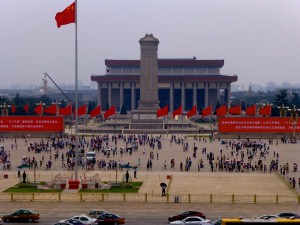 tourists are flocking to China by the millions. Another thing China excels in is knock-offs. Anything you can buy in the West, is available in China for a lower price. From a Mercedes Benz to a Swiss watch to a Canon Camera, it’s all available. More will be said on this in Part III.
tourists are flocking to China by the millions. Another thing China excels in is knock-offs. Anything you can buy in the West, is available in China for a lower price. From a Mercedes Benz to a Swiss watch to a Canon Camera, it’s all available. More will be said on this in Part III.
Photo: Photo looking across Tiananmen Square toward the Mausoleum of Mao Zedong. Around this area, police, security guards and plainclothes sentinels were evident in great numbers.
All the while, Chairman Mao lurks in the background as the Benevolent Father of the Great Proletarian Cultural Revolution. People seem to have totally forgotten all the bad parts of how that revolution was conducted. This demonstrates a real strength of the Chinese people – a willingness to forgive and forget anything bad. The same thing has taken place with respect to their view of the Japanese. All the bad things that happened in the first half of the last century have been set aside. China is indeed a country like none other.
3. Litter and Recycling
One of the few things China is not a leader in is garbage collection. Garbage and graffiti is present in every nook and cranny, particularly in and around apartment buildings. However, this comes to an abrupt end wherever a government gem (e.g. tourist hot spot, show park, five star facility or other point of interest) begins. But, the garbage also provides a clue to a frequently asked question, can a stray dog or cat can survive in China. Although we did not see any wandering around, there was enough spoor present to suggest those species are doing well. Perhaps in China they have become nocturnal.
Lorin suggests a good measure of our ‘awareness’ of the mess is a result of living in the pristine, almost antiseptic, conditions that have come to define Victoria. He is probably right, after all Victoria is a city where lawns are maintained using manicure scissors and curry combs, where the most beautiful wild flowers and shrubs spread like weeds and watering lawns and gardens takes precedence over drinking water. And if that is not enough, the people of Victoria cultivate hundreds of flowering baskets and boulevard planters each spring. Everything humans touch in Victoria and then don’t want, is recycled and city residents protect wild rabbits, deer, cougars, otters and other lessor species such as squirrels and rats, as if they were our collective children.
Just imagine how a citizen of China who has never before travelled outside their country must feel when they arrive in Victoria. Culture shock, of course! How could people possibly live like this?
4. A Traffic Cop on Every Corner. Not.
While the traffic in Beijing is heavy, it actually moves much more efficiently than in Vancouver, a city that tops the list as the worst in North America (Huffington Post Link) . What causes traffic to grind to a halt in Vancouver is a belief that traffic safety as provided by strict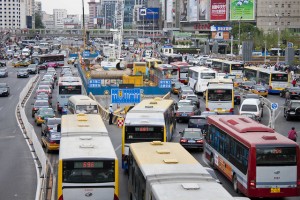 legislation and strong enforcement are mutually inclusive goals that help to move large volumes. Beijing is a case study that proves this wrong.
legislation and strong enforcement are mutually inclusive goals that help to move large volumes. Beijing is a case study that proves this wrong.
Photo (Web Source): While traffic is mandated to travel on the right, that is about the only traffic rule that prevails in China. Everything else requires an individual to think quickly and cause as little interference as possible.
What clearly helps in Beijing, a city with many times the volume of Vancouver – there are few traffic rules and little or nothing in the way of enforcement. Implementing a Vancouver strategy would cause things to grind to a halt. The telescoping effects of a few rush hour (that’s 15 hours a day in Beijing) crashes would spread so quickly it would snarl the entire city; it would take weeks to get things moving again. The whole enterprise is like a finely tuned perpetual motion machine. In Beijing the millions of drivers, riders and pedestrians, simply don’t worry about anything except the common sense rules like driving on the righthand side of the road. It’s something that even the British, Australians and New Zealanders never figured out.
Generally, Beijingians (Beijingers, Beijingistas) don’t worry about making a mistake or getting caught, they just get on with the business reaching their destination in the least possible time possible. Cutting corners is no big deal.
5. How Drivers and Pedestrians Help Each Other in China
All drivers and pedestrians act as mentors to other drivers and pedestrians. The Chinese are, after all, essentially a courteous and helpful people. For example, they help others by blowing their horn if another driver, rider or pedestrian is about to intrude upon their space. For pedestrians, they will gently push you aside if you block the flow by dawdling along. In Canada we would never honk our horn at a dawdling driver blocking the fast lane. No, we would just tag along behind, then wave and mouth ‘sorry’ when we finally managed to pass. Try blocking a lane or holding up traffic in China and see what happens.
As for pedestrians, Victorians walk on the right and always wait for another to enter a doorway before us. We can sometimes stand ten minutes holding a door open if things really busy. And, as for lineups, we are so courteous that by the time our turn comes, we might even ask the person behind us if they would like to go first.
Taking turns in China is simply a matter of first come first serve, a perfectly understandable attitude in a country of 1.5 billion. Take the case of flagging a cab. Just try casually walking up as the cab cruises to a stop! In the split second you delay, four other persons will pull ahead. Of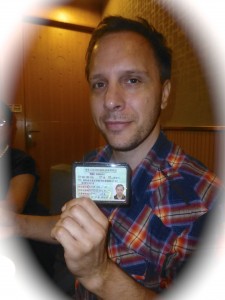 those four, three will be just a little slow off the mark. If you continue to lag, you may well end up walking to your destination. These sorts of behaviour may seem impolite to us, but they are only intended to speed up the flow in a very congested city.
those four, three will be just a little slow off the mark. If you continue to lag, you may well end up walking to your destination. These sorts of behaviour may seem impolite to us, but they are only intended to speed up the flow in a very congested city.
In Beijing, the city fathers also ask one-seventh of the car owners to leave their cherished vehicles at home one day a week. For those absolutely in need a vehicle that day, they just take the licence plate off. And speaking of no licence plates, Lynn and I observed hundreds ominous looking, large, black vehicles with tinted windows. They seemed to have free access to driving lanes and parking spots. No one ever offered us a suggestion or made a negative comment as to what those Darth Vader like vehicles might represent.
On our first day out, Lorin proudly displayed his newly acquired Chinese Drivers Licence. We understand it took him several weeks to earn the licence as he was always too slow off the mark, too much the polite Canadian we suppose. We see he is still on a steep learning curve as other drivers constantly blow their horns and make hand gestures at him as we travel around Beijing and elsewhere. As a testament to his dogged determination, never once did he become frustrated or respond in kind. Lorin has always be an easy going chap, who was slow to rise to anger. This was no more evident than in his hockey career.
6. Pandas and Other Such Stuff
As for hustle and bustle along sidewalks and at venue entrances, we again found the Chinese to be helpful. When trying to make known our interest in purchasing tickets to the Beijing Panda Zoo for instance, all kinds of people kept pushing and crowding around as they sought to help us make the purchase. It was all very confusing, but someone must have said something that helped as we were finally rewarded with a pair of tickets. After 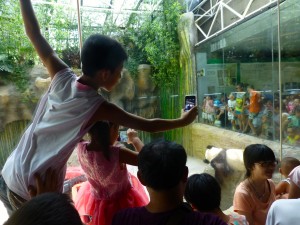 that, an even larger group helped to move us through the gate and towards the exhibit. Moving around in crowded places takes practice.
that, an even larger group helped to move us through the gate and towards the exhibit. Moving around in crowded places takes practice.
Photo: A young man tries to catch a shot of the only Panda we could find.
As we were to slow off the mark, we ended up at the back of the crowd. Like others, I raised my camera high and snapped several photos as we strained to catch a glimpse of a Panda. Sure enough, on my third try, there she (or he) was, carelessly sprawled over a baron rock behind a floor to ceiling glass partition.
I took several colour photographs, but that black and white, rather ragged looking little puffball, never once blinked or twitched even with all the commotion outside her cage. Lynn and I wondered if China, in a show of goodwill to Canada and other countries, had given away their entire stock of Pandas. To keep the citizens of Beijing and tourists happy, perhaps they had placed a stuffed Panda on that rock. We assure you, no on could tell the difference as it never once moved. At least we can tell our friends back home that we saw a Panda in China. They will be so impressed.
A bit earlier, I mentioned a lack of police presence as far as traffic was concerned. Well, that does not mean a lack of police, as around areas frequented by tourists they are quite evident. One day after Lorin dropped us near a famous Buddhist Temple, we took a tour on foot before entering. The streets were crowded and as at every popular tourist stop, venders, hawkers, gawkers (that be us) and the indigent, filled the streets.
In China, beggars, if nothing else, are persistent. Mothers with children, children without parents, old people, young people, blind people and the mentally ill, are all represented. It became apparent the uniformed and plainclothes police assigned to the area were making an effort to help some of the more unfortunate. If any dallied too long, were too persistent, created a ruckus or otherwise seemed in distress, the officers would carefully load them into a van and take them away. We suppose there must be number of homeless shelters around Beijing where these poor souls could get a meal, medical assistance or whatever other help they might need.
7. The Forbidden City
Stuffed Panda’s and homeless aside, there are great many wonderful things to see in Beijing, including such notables as the Forbidden City, Tiananmen Square, The Hall of Prayer and a number of pristine parks that cater to every interest from environmental protection to advanced science. However, to limit the discussion, one day after exploring every nook and cranny of the Forbidden City, Lynn and I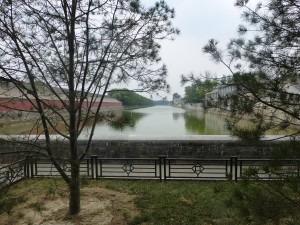 felt a need to rest our weary feet.
felt a need to rest our weary feet.
After exiting an East gate and crossing a moat outside the wall, we found a small but trendy hotel that clearly beckoned. While the staff was courteous, we were surprised to find them somewhat uncomfortable with our presence. After pleading our case by collapsing in the lobby, they finally deigned to seat us in a secluded lounge that faced the moat.
While enjoying our tea (actually, I opted for bottle of Tsingdao), we watched an endless stream of well-dressed businessmen accompanied by their young (an beautiful) secretaries heading to a business-luncheon in some other part of the hotel. Lynn and I joked that secretarial schools must double as modeling agencies as these stunningly attractive young women were able to draw attention merely by their presence.
On our way out while paying the tab, we happened upon the owner, a gregarious, 6’4”, Australian in his late forties. He looked and acted very much like Tony Soprano. As we joked and traded barbs and one-liners about Canada, Australia, and New Zealand, it was clear the staff within hearing distance were nearly apoplectic. We learned the man owned a dozen similar hotels in Beijing and, as well, had a controlling interest in several five star restaurants. His demeanor suggested this was no idle boast. As we left and he turned back, the staff bowed in unison and backed away as he purposefully strode to his office.
It seems the hotel and restaurant business in Beijing and other Chinese cities is doing very well and if this establishment is an example the Empress, Grand Pacific and other hotels in Victoria might do well to take a page from Tony’s book on hotel management. Then, we head home for a good night’s rest at our own hotel.
The tour will continue in Part II, as Lorin has told us to pack our bags as we are heading to his second home in Shijiazhuang. It will be another whirlwind tour where we get to experience daily life in a much smaller city, one about the size of Vancouver. He again warns us Shijiazhuang stands among the most smog-ridden cities of China.
Harold and Lynn
Full Photo Series Link Here for Part I
Link Here for Part II of this Story
Footnotes
1. In February 2014, I read the book Lost on Planet China by J Maarten Troost, an author who lives in California. While I very much enjoyed the humour he brought to his descriptions, I felt his view was coloured by his being a citizen of the United States. There are, to be sure other views of China. To this end I sat down and began writing this three-part post about the impressions that Lynn and I gained while wearing our Canadian “rose coloured glasses”. Our view of the country is much different from that of Maarten Troost.
2. About Lorin: Why do we call him amazing? Easy. He loves adventure; he’s never afraid to speak his mind, he is a life long learner and he is willing to tackle difficult tasks.
Over the past twelve years he travelled to and lived in many parts of China and has even learned the language, well at least one of 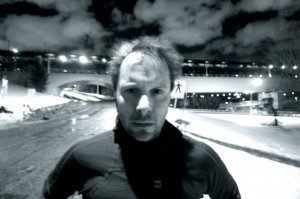 the fifty or sixty dialects. Earlier in life he travelled much of the Middle and Far East as well as the European Continent.
the fifty or sixty dialects. Earlier in life he travelled much of the Middle and Far East as well as the European Continent.
Perhaps his attraction to an adventurous lifestyle is a trait that runs in the family, after all, his mother grew up in the wilds of Northern Alberta (link) and the adventures of his father made the man an icon by the time he reached his early twenties.
Photo (Facebook): In a reflective moment during a blizzard, Lorin contemplates the meaning of life as he stands in the middle of the Anthony Henday Drive in Edmonton, Alberta. That afternoon the young man had just successfully defended his doctoral thesis at the University of Alberta. Hello, Doctor Lorne Yochim.
Beyond this, his Auntie Dianne is currently on a thirty-day jungle, back packing, adventure in Guatemala and Honduras with her partner and a friend. It is a trek that makes your blood run cold. A few of her stories, written while slogging around in torrential rain and among machete wielding families, will soon be posted.
As for Lorin and true to his calling, he tackled China as a teacher, more precisely as a teacher, teaching teachers. He not only loves teaching, but also loves to learn, his lifelong passion – learn about other countries, about other people and about other cultures.
(3763)
Tags: An Jin, Harold McNeill, Lorin Yochim, Lynn McNeill
Trackback from your site.

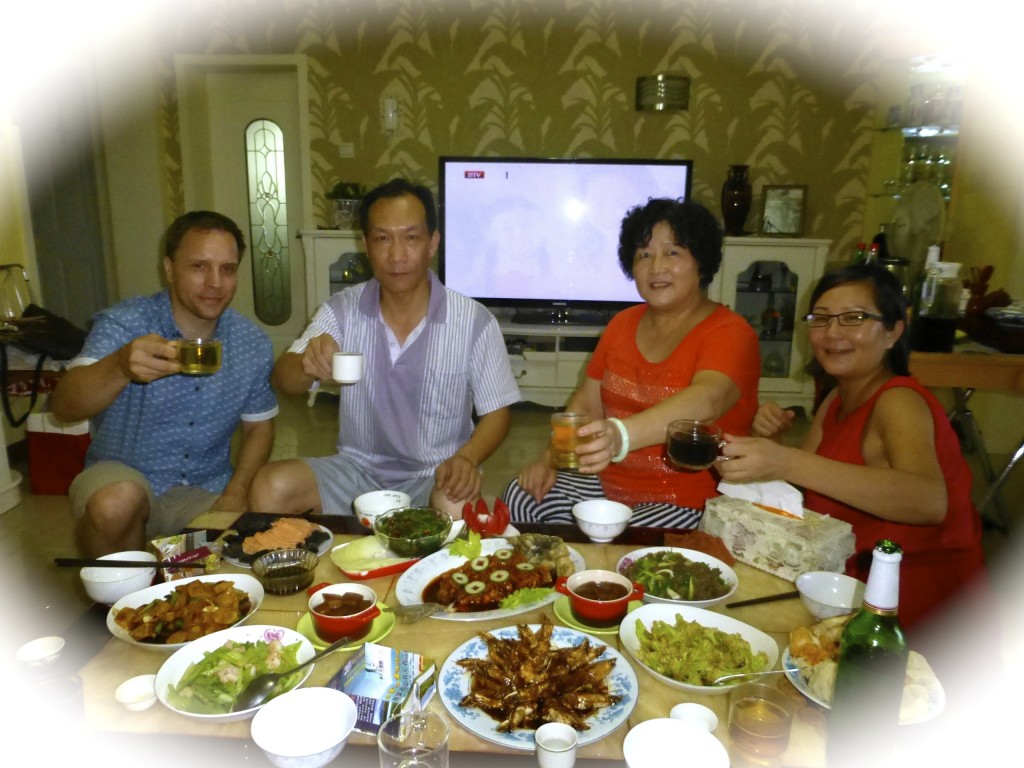
Comments (4)
Harold, I have to apologize. You asked me to proof read this a while back. I did but forgot to respond. I’ll do it here if you don’t mind.
In this post you are both right and wrong about everything you say. I offer a few corrections.
1. It is “Jin,” not “Jean.” Several of your former girlfriends will be disappointed by this.
2. It is “Qingdao,” not “Quindao.” Nobody will disappointed by this until they find out the name of the city is more recognizable as Tsingdao, home of China’s most famous and mediocre lager. All Chinese lagers are, in my experience, mediocre at present. Come to think if it, almost all Chinese beers are lagers. “Of course they are!” my father in law says. “We used to have many different kinds of beer, but we Chinese decided that this was the best kind, so why have so many different ones!” Why, indeed?
3. I do honk, but only to politely force people to butt in front of me in traffic jams.
4. My tanned and rugged look were more of the northern Alberta raised wolverine variety. I do not say “dude” or “hang loose.” A recent trip to Hawaii has me reconsidering these commitments.
5. About those statuesque personal secretaries…never mind.
6. Please write a post about the adventures of my father.